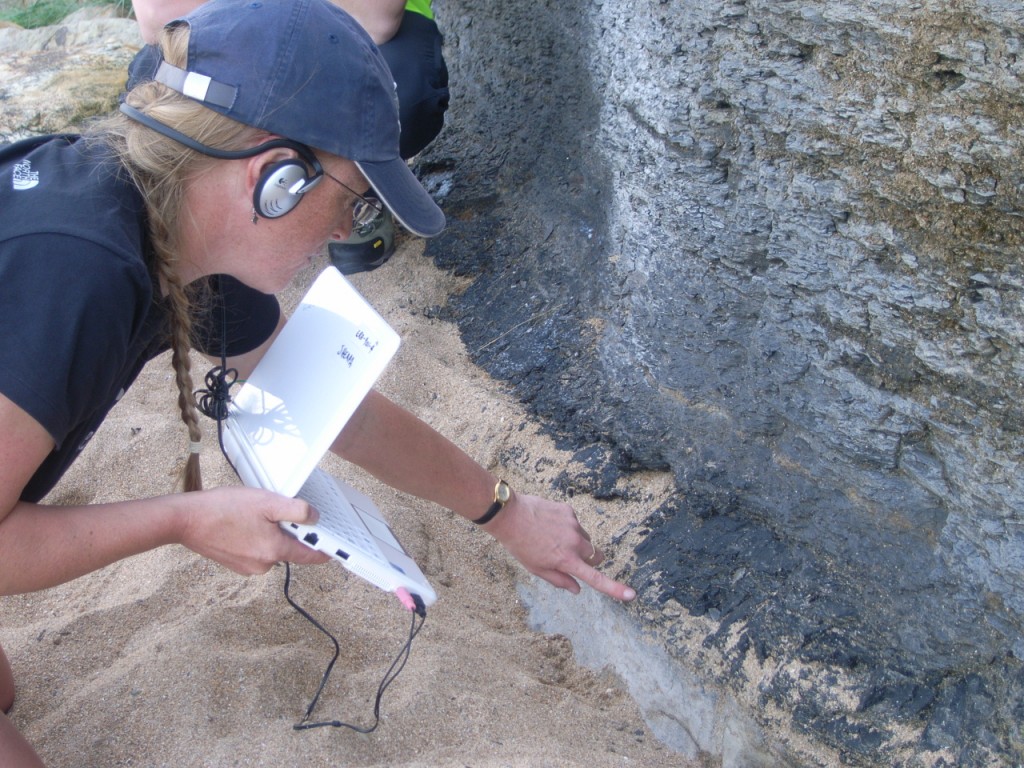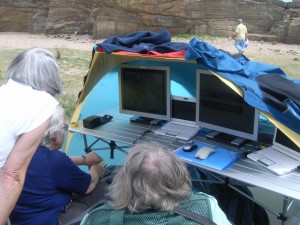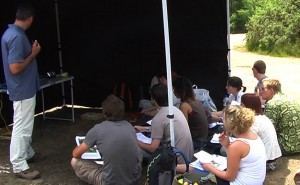At the end of June, we conducted some experiments to evaluate the performance of ERA-assisted fieldwork compared to the same fieldwork task being performed by students visiting the site directly. Four groups of students volunteers visited Devon Great Consols to perform an Environmental Impact Assessment (EIA) task related to a fictional plan to exploit metals available in the waste heaps on the site, left over from its time as an arsenic extraction plant in the late 19th and early 20th centuries.
Tag Archives: student trials
Investigating video upgrades
During our field trials, it became clear that the built-in video camera on the Asus EEE 901 (and 701) is in the wrong place for our needs.

Using the Asus Eee PC 701's built in camera to capture geological features. The camera is built in to the top of the screen and is clearly designed for 'video diaries' or online video conferencing rather than capturing views of the landscape.
The 901 camera itself is a pretty good (for a plastic lens webcam) 1.3 megapixel device that’s supported in Ubuntu, but it faces the user, and we want it to face the rest of the world. Additionally, we found when using an external USB webcam, that being able to hold a smaller separate device or mount it on a helmet, rather than trying to point a whole netbook, was both easier and safer when clambering about on the rocks. From our experience and listening to the field geologists, we came up with a wish list of properties for a new video camera… Continue reading
Durham field tests
The ERA team has just returned from a week-long field trip in the North East of England, based at Durham University. We did tests at locations related to OU Geology module SXR369 along the Northumberland coastline. We trialled new (to us) VoIP services including 2-way video with a view to assisting students with limited mobility to experience geological fieldwork alongside their more mobile peers. Expect to see some news and test results here in the next few days.
The curse of ERA strikes again! (sunshine :-) )

Tutor and students at the ERA base location viewing the video feed and communicating via VoIP with the field geologist. Howick, Friday 07 August 2009
The curse of ERA – bringing sunny weather to field trips – strikes again! Despite packing gaiters, gortex, and waterproof sample bags to protect our kit, it was the sunshine rather than the rain that was the challenging weather for the Durham area field trips.
Jokes aside, we’ve had great weather, mainly sunny with the occasional light smattering of rain. This is actually a significant factor for us when we’re working in the field. The radio signal isn’t affected by rain to any great degree, we’re fairly confident that students will dive for cover before the radio signal deteriorates too far in rainy conditions, but we have to watch out for sun and rain when it comes to using the equipment in the field.
We’re aiming to use off-the-shelf, consumer equipment as much as possible so as to come up with a solution that could be taken up by the greatest number of other educational institutions. There is heavily ruggedised military-specification equipment for most of what we’re doing but the cost and weight factors puts this out of our league and probably would make the ERA system much less likely to be adopted by a broad community of users. Continue reading
Fieldwork meeting with Professor Bob Spicer
I met with Bob Spicer an OU lecturer who we will be workiung with when we go to our Durham residential school at the beginning of August. Bob will be tutoring on the SXR369 course and will be responsible for supporting the students with additional requirements. Bob was kind enough to go through the fieldwork locations and advise us on where the students access the sites and which areas they are interested in. This was really useful information for us as we can then go to the same locations when they are not being used by the students on the course in order to identify the best setup for each site.
